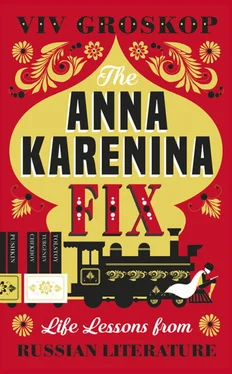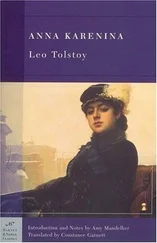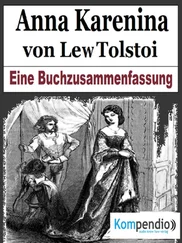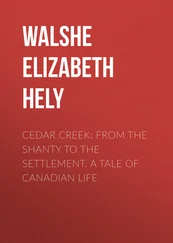It is not surprising that Anna Karenina is frequently described as the greatest novel of all time, precisely because of the way it approaches these big questions but without finding easy answers. William Faulkner held this view, as did Dostoevsky. Nabokov – who was an incredibly grumpy person and did not suffer fools gladly (even less so than Dostoevsky, which is really saying something) – said the style was ‘flawless magic’. Tolstoy himself considered it a better novel than War and Peace . In fact, he did not even consider War and Peace to be a novel. He thought it was episodic fiction, a series of short stories. Anna Karenina , however, was a novel and – initially – he thought it was good. I often wonder what Sofya, Tolstoy’s wife, thought about him considering the 2,200-page War and Peace ‘not a novel’. She had to copy it out repeatedly. I imagine she had some other words to describe it, and probably quite diminutive words at that.
Of course, there are many answers in the novel to the question ‘How should you live your life?’ You could choose a simple, unquestioning life of luxury like Anna’s brother Stiva, a man who only drinks champagne with people he likes (and he drinks champagne with everyone). Or you could choose Levin’s path: self-sacrificing, righteous, spiritual. Levin is supposed to be the prototype for happiness – for example, with his steady, even rhythm of life – but he doesn’t in fact seem that happy and frequently tortures himself about whether he should be spending more time ploughing fields.
There is an intriguing mix of hedonism and self-flagellation in Anna Karenina . Before the author, in the early chapters, has even invited us to the Anglia Hotel for a slap-up meal of oysters and turbot with Stiva (Anna’s brother) and Levin, Stiva’s best friend, Tolstoy has already casually dropped in the Epigraph of Doom: ‘Vengeance is mine. And I will repay.’ It’s a quotation that suggests that, in life, if there is any revenge to be taken, God will sort it out in his own way. You had better not do it yourself. It is an incredibly powerful and disturbing choice of words to slap on the page next to the title of your novel, and one that marks Tolstoy out as someone who is obsessed – or beginning to be obsessed – with God and with the idea that it is foolish to imagine we are in charge of our lives (because we’re not in charge, God is). It sounds very much like the voice of God himself. And it doesn’t exactly mark Tolstoy out as Mr Fun Times.
The heavy-handed, preachy tone of that scary epigraph is a harbinger of the sort of writing Tolstoy was to specialize in later in life, after he more or less disowned Anna Karenina . Even at the time he was writing the novel, he was already tortured by a lot of the philosophical ideas that came to dominate his thinking and led him to a monk-like existence as a teetotal vegetarian, committed consumer of boiled eggs and serial avoider of pastries. (So often, I’ve wanted to travel back in time and get him to try a jam doughnut. I feel sure he would have written more novels. The man just needed sugary carbohydrates.)
But it’s also a strange lesson in wishful thinking. I can’t help feeling that Tolstoy wanted God to take his revenge on Anna Karenina (for being a dirty, filthy adulteress) but, at the same time, the human being in him (who had committed a lot of dirty, filthy adultery himself) sees her fragility and attractiveness as a person and wants to forgive her. The contradictory nature of the epigraph is a clue as to why Anna Karenina is such a complicated novel and does not deliver a clear, unambiguous message about how to live. On the one hand, Tolstoy sets out to write a didactic novel where no one dares challenge God’s laws without terrible consequences and where Levin (the ‘good’ Tolstoy) is the hero of the piece. And yet, on the other hand, and almost in spite of himself, he ends up drawing a beautiful portrait of Anna Karenina, infused with empathy and compassion. There’s a way of looking at Anna not just as a character and a woman but as an extension of Tolstoy himself: the ‘bad’ Tolstoy, the foolish side of himself that he wishes didn’t exist.
It’s this contradiction that makes Tolstoy the best guide to life. He is both flawed and honest, and these qualities are not always intentional. In fact, he tries to cover them up. But that only makes him more likeable. Even the most cursory glance at his life shows that he was an immensely and amusingly complex character. That is why – with reservations – I love him. He is a tricky bugger, with many bad character traits and psychological inconsistencies, which plagued him his whole life and which he tried desperately to overcome. But aren’t these very much the qualities anyone should seek in a lifelong friend?
Everything you need to know about Tolstoy is summed up by what he did to his wife on the eve of their wedding. He was thirty-four. She was seventeen. He felt bad about the fact that he had had a debauched youth, sleeping with prostitutes, Gypsies and parlourmaids. He had fathered a child by one of the serfs on the estate. (I love that in the author biography in the original Penguin edition of Anna Karenina this is described as ‘a life of pleasure’. It’s what my grandma would call the life of Riley.) He felt so bad about all these ‘pleasures’ that he showed his wife-to-be his diaries, which extensively detailed all his exploits and the venereal disease they had resulted in. The same episode plays out, of course, between Levin and Kitty in Anna Karenina . Decades later, in her diaries, his wife wrote that she never recovered from the shock.
This information about Tolstoy’s character has always been out there and has been easy to find if you were looking for it. However, in the past decade in Russia, there has been a resurgence of interest in Tolstoy the real person (as opposed to Tolstoy the great genius) thanks to Flight from Paradise , a fascinating biography by Pavel Basinsky. This book is a controversial account of Tolstoy’s final days and won Russia’s national book prize. Until recently in Russia, and since the dawn of time in academia, looking too deeply into a writer’s biography has been frowned upon, because this is seen to lead to a shallow appreciation of the important thing: the writing. But something about Basinsky’s book broke the spell for Russians, and everyone became fixated by it. An entire nation thought to themselves: ‘What if we looked at Tolstoy as an ordinary person who struggled with his emotions, got very angry with his wife and had very particular feelings about serving suggestions for eggs?’ This was the Tolstoy Basinsky uncovered, and Russians loved it. I have no evidence that egg sales from Arkhangelsk to Vladivostok soared, but I like to pretend to myself that they did.
Here was a man who was difficult, infuriating, sometimes rather cruel to his family and tortured by his own nature. This, at least, explained a lot of the contradictions and complexities in his work, including why the themes in Anna Karenina can be so hard to pin down. Basinsky’s book also sought to give some context to what is perhaps the most shocking act of self-loathing in literary history. Almost as soon as Tolstoy finished the novel, he renounced all artistic work in favour of what he called a ‘spiritual rebirth’. As discussed, I know we are not supposed to read too much into authors’ biographies. But I really don’t think you can ignore the fact that someone writes a novel full of emotion and passion which becomes known as one of the greatest works of art ever created and then they turn around and basically say, ‘Well, that was a disgusting waste of time. I am going to go and be a peace-loving vegetarian now.’
Читать дальше












